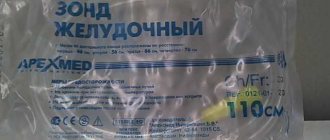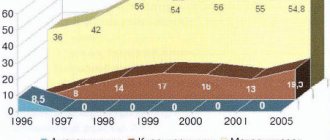Full text of the article:
It is known that the period of breastfeeding is the most important stage in the life of a baby. Breast milk is the best nutrition for a baby; it contains all the necessary vitamins and microelements for proper growth and development. Psychologists say that breastfeeding also strengthens the bond between mother and child
and is an important part of the psychological development of his personality.
However, not all young mothers are able or willing to breastfeed. Some people believe that high-quality artificial formulas will cope with this task perfectly, some are afraid that the breasts will lose their shape, and others justify the switch to artificial formulas by insufficient milk. However, in some cases, it is indeed better for a mother to refuse breastfeeding due to medical contraindications
. Most often this is due to existing diseases. The final decision in such a situation should be made by the doctor, assessing the condition of the mother and baby.
Is it possible to breastfeed a child during illness?
Women are advised to especially carefully monitor their health, starting from the stage of pregnancy, but even after the birth of a child, these tips remain relevant, because the period of breastfeeding can last about a year. At this time, the connection between mother and baby, although as strong as during pregnancy, is still very strong. The mother must monitor her diet and well-being so as not to endanger the baby.
In some cases, you may not give up breastfeeding even during illness, if the mother’s condition does not cause concern. However, there are several types of diseases, the presence of which is an absolute contraindication to breastfeeding
:
- active forms of tuberculosis;
- syphilis;
- HIV infection;
- Human T-lymphotropic virus types 1 and 2;
- brucellosis;
- especially dangerous infections: plague, cholera, typhus, etc.
Breastfeeding is also
. A ban on breastfeeding may be justified by the general condition of the mother if she has been diagnosed with serious diseases of the liver, kidneys, heart or brain, which do not allow her to spend additional energy on lactation.
When deciding on the possibility of breastfeeding, not only the physiological, but also the psychological state of the woman
, especially if pregnancy and childbirth occurred with complications. Acute postpartum mental illnesses and disorders can cause deviant behavior. A woman can become potentially dangerous to her child. There are cases where mothers tried to harm their baby and even kill him.
To normalize their mental state, women are prescribed powerful drugs to combat postpartum depression or postpartum psychosis. However, these drugs can be harmful to the child and negatively affect his growth and development, so breastfeeding will have to be abandoned.
Features and reasons
Rotavirus is a common infectious disease characterized by damage to the gastrointestinal tract. The disease is highly contagious, so often when one person becomes infected, the entire family or team becomes ill. Not all disinfection procedures help destroy the pathogen. The virus is tenacious and can live in water and soil for a long time before entering a favorable environment.
Rotavirus is transmitted through household contact, water and food. Anyone who does not take care of their health and does not follow the rules of personal hygiene can become infected. Women who have given birth are especially susceptible to infection. This is due to a decrease in immunity after childbirth.
The penetration of rotavirus infection into the body of a nursing mother is provoked by the following reasons:
- contact with contaminated surfaces in public places;
- consumption of unwashed vegetables, fruits, raw running water, unboiled milk;
- sharing household items with the sick person (towels, dishes);
- non-compliance with personal hygiene rules, lack of the habit of washing hands;
- swallowing water from a pond while swimming.
Contact with an infected person through clothing and household items guarantees the appearance of signs of rotavirus. Physical touch is the main way of infection between a breastfeeding baby and a nursing mother.
What diseases do not prevent breastfeeding?
Some women stop breastfeeding at the first sign of discomfort, fearing to pass the infection to the baby. This is the wrong approach. Common viral infections, such as flu or sore throat, are safe for your child
. Another thing is compliance with standard hygiene measures for ARVI. It is necessary to ensure the room is ventilated, communicate with the child and other people wearing a protective mask and wash your hands.
Continuing breastfeeding while fighting a viral infection is even useful; it will be a kind of prevention for the baby. The mother's body will produce antibodies that will sooner or later cope with the virus. These antibodies will inevitably penetrate into breast milk, and accordingly, the baby, along with mother’s milk, will receive reliable natural protection against the virus.
Diagnostics
If during an exacerbation of an intestinal infection during breastfeeding characteristic signs of the disease are observed, it is necessary to donate blood and stool for laboratory testing. A high level of leukocytes and accelerated erythrocyte sedimentation are evidence of intoxication of the body. Stool sampling is carried out to establish a polymerase chain reaction for RNA-containing viruses. A mandatory stage of diagnosis is examination of the patient. Damage to the nasopharyngeal mucosa, congestion, cough are signs of rotavirus.
Lactation when the child is ill
If it is not the mother who is sick, but the child, then stopping breastfeeding is also unreasonable. No artificial formula contains as many vitamins and nutrients as breast milk. In addition, it has been proven that the composition of breast milk can change depending on the needs of the child, it turns out that breast milk in this case will act as a natural medicine and will help the baby overcome the disease. If the mother has no problems with lactation, then breast milk will only benefit the baby.
Although there are cases when the child’s health condition can become an absolute contraindication for breastfeeding. It is strictly forbidden to breastfeed children suffering from galactosemia.
. This genetic disease is characterized by metabolic disorders. The child’s body is unable to convert lactose into glucose, which can result in severe damage to the digestive, visual, nervous and other systems of the body.
Prevention measures
The rotavirus epidemic, observed from January to April, is observed in many regions of Russia: Sverdlovsk region, Nizhny Novgorod, Nizhny Novgorod region, Vladimir region, Kemerovo region, Saratov region, Sakhalin region, Stavropol region, Chelyabinsk region, autonomous regions, Moscow region, Irkutsk region , Krasnoyarsk Territory, Krasnodar Territory, Kirov Region, Bryansk, Kaliningrad Region, Komi Republic, Volgograd Region, Republic of Bashkortostan, Tatarstan, Ivanovo, Tula, Kaluga Regions.
To avoid infection, healthy people must follow preventive measures:
- do not visit public places during the spread of rotavirus in the territorial district;
- wash your hands regularly;
- thermally treat products;
- use boiled water;
- carry out wet cleaning, ventilate the room.
A child most often becomes infected with rotavirus from a sick mother through the fecal-oral route. It is recommended to regularly wash bath accessories and bed linen, treat dishes from which the baby eats with boiling water, and wash your hands before each breastfeeding. Stomach diseases if preventive measures are not followed are dangerous for the baby with serious consequences.
Breastfeeding premature babies
The breastfeeding period is important for all babies, but especially for those born prematurely. There should be a special attitude towards premature babies, because they, as a rule, are born weaker. The body of premature babies has almost no resources of its own to fight viruses and infections, so even after birth they need maternal protection, which breast milk can provide.
Breast milk contains the highest concentration of nutrients, and the milk of mothers whose babies were born prematurely contains more protein, which premature babies need. Special fats contained in breast milk help in the development of the brain and all senses. Often babies born prematurely have problems with the development of the visual system.
Medications
The main drugs prescribed for the treatment of rotavirus are:
- enterosorbents;
- electrolytes;
- antiemetics;
- antipyretic medications.
Medications are non-toxic and therefore safe for a mother during lactation and a small child. Enterosorbents Sorbex, Enterosgel, Smecta remove toxins and pathogenic bacteria from the body. Electrolyte medications are used to restore the acid-base balance, which is disturbed due to the leaching of beneficial microorganisms during the release of loose stool due to rotavirus. To maintain the level of water and salt in the body, the baby is prescribed intravenous injections of plasma-substituting solutions. Prokinetic agents Domperidone and Metoclopramide stop frequent vomiting.
How to support lactation?
Lactation is a natural process, but it can be unusual for new mothers. You need to understand that lactation does not work “like a clock”; a certain transition period must pass, during which the body will have to readjust and begin producing the amount of milk necessary for the child. Despite the fact that mother and child were recently one, after birth they will have to get used to each other again. Some women do not experience a shortage of milk throughout the entire period of breastfeeding and are even ready to share it with those mothers who do not have enough milk. In order for the lactation process to last as long as possible, you need to adhere to the following recommendations
:
- Don't be afraid to overfeed your baby
. The child will take as much as he needs. The very fact of putting a baby to the breast will signal the mother’s body that milk is still needed. - During feeding, you should try to relax
and completely redirect your attention to the baby. Tactile contact is important; from the very birth of a child, you need to learn how to properly attach to the breast so that the feeding process does not cause inconvenience. - To facilitate the process of milk release, it is recommended to regularly massage the breasts
, be sure to do this before and after feeding. - You should try to feed your baby exclusively with breast milk
, and not from a bottle, otherwise the baby will quickly refuse the mother’s breast, because it is more difficult to suck from it. - There should be enough milk for the baby to completely satisfy his hunger
; if the milk in one breast runs out, you need to immediately put the baby on the other so as not to interrupt the feeding process. - If there is not enough milk, you need to consult a specialist
; perhaps he will prescribe additional vitamins or advise you to try “folk methods” of increasing the amount of milk. It is better not to experiment with such recipes on your own.
Symptoms
The incubation period of the disease is a week. The signs of rotavirus infection in a nursing mother differ from the symptoms of intestinal flu in a child. In an adult whose digestive system has formed, the stomach contains enough hydrochloric acid to reduce the content of pathogenic viruses and bacteria. When previously infected with rotavirus, middle-aged people produce immunoglobulin, which prevents the penetration of harmful microorganisms.
The main symptoms that a mother has are:
- weakness;
- liquid, watery stool several times a day;
- pain, soreness during swallowing.
We recommend: What you can eat after appendicitis removal
The absence of pronounced symptomatic signs in an adult leads to untimely diagnosis of the disease. Manifestations of rotavirus disappear after 3 days without special treatment, but a person is a carrier of intestinal flu.
The main symptoms of infectious pathology in a child on breastfeeding include:
- regular vomiting;
- frequent discharge of liquid feces with a clayey consistency of gray-yellow color;
- abdominal cramps, increased gas formation;
- discharge of dark urine;
- feverish condition;
- runny nose;
- sore throat, cough;
- hyperthermia;
- decreased food cravings;
- crying, increased excitability, nervousness.
Signs of intoxication and damage to the intestinal tract appear within 1-2 days after a pathogenic infection enters the body. The acute period of rotavirus in a child is observed for 3-5 days. Treatment time until complete recovery is 6-7 days.









